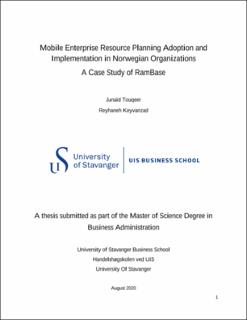| dc.description.abstract | In an age of ongoing technological advancements and mobility, there is an ever-increasing need by the companies to find smart solutions to manage their businesses. Organizations around the world use Enterprise Resource Planning (ERP) system, a systemic technological tool, to increase their performances. Researchers agree upon the fact that mobile information technology (MIT) is an indispensable asset for the longevity of an organization’s innovation practices and economic stability. With the IT revolution, the number of enterprises adopting, implementing, and using mobile information and communications technology has increased. The mobile enterprise generates productivity in small projects and saves costs in the medium to large scale companies giving competitive advantages. RamBase, a straightforward cloud-based Norwegian ERP provider, has a desire to evaluate its current mobile computing application potential in both IOS and Android operating systems and to look for improvement opportunities in this branch. Cloud ERP enhances tracking of incoming raw material and outgoing final products to extend the visibility and control inside and outside the enterprise.
As very few studies have been done on the implementation and adoption of a mobile ERP (M-ERP) application so in this thesis, we aim to explore the importance of Mobile ERP (M-ERP) for today’s business environment. We specifically studied the research question: How can RamBase develop a productive M-ERP for its customers while considering the crucial implementation success factors? We applied the qualitative approach by conducting a literature review in addition to a case study. An online survey related to experiences with mobile ERP use, strengths and challenges and opinions on the implementation of mobile ERP was conducted. A questionnaire was formulated to collect data points for the desired variables and was sent out to major firms which were using RamBase’s ERP system. It consisted of both open-ended and closed-ended questions. The questionnaire data were analyzed using descriptive statistics, thematic analysis, and content analytical techniques. Survey results were discussed during a consultation with fellow students to identify key considerations in the implementation of mobile ERP.
Our findings suggest that the critical ERP modules for small-medium enterprises (SMEs), which have employees ranging from 10 to 249 and are operating in the manufacturing industry are administration, production, and finance. Previous studies have shown that the access to required modules through the mobile phone enhances the productivity and performance of an organization. The core features of the M-ERP applications include the real-time query of information regardless of location, traceability of information and approval of workflow. The challenges identified by the users and validated by the literature include security, screen size, platform compatibility, training, and user interface. Due to significant complexities in each ERP module, it is not feasible to start developing a mobile application for the whole module. A simple application with the key features of the module will have more usability than a complex whole module application.
RamBase should identify the functionality of production, administration, and finance M-ERP modules according to the insights available from their customers. The initial applications should be small with specific functionality for a single group of people. This bottom to top approach will save time and money. | en_US |

